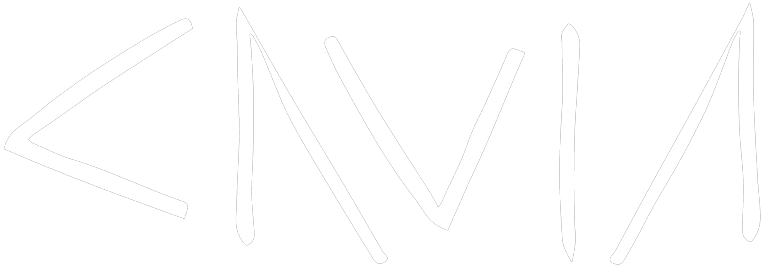November
| Vr. 1 | : Pura Sangre |
| Za. 2 |
: Chained for Life |
| Za. 2 |
: Pura Sangre |
| Za. 9 |
: Clásicos Latinoamericanos: Wara Wara |
| Ma. 11 | : It’s About Time To Start (two films by Kaya Erdinç) |
| Vr. 15 |
: Anarchist Film Festival |
| Za. 16 |
: Anarchist Film Festival |
| Zo. 17 |
: Anarchist Film Festival |
| Ma. 18 |
: Anarchist Film Festival |
| 19 - 28 | : CAVIA CLOSED FOR RENOVATIONS |
| Vr. 29 |
: The Other Side of The Underneath + Lecture |
Vrijdag 1 november, 20:30
Zaterdag 2 november, 22:00
CLASSIC
Pura Sangre
Luis Ospina | 1982 | Colombia | 100’ | EN subs
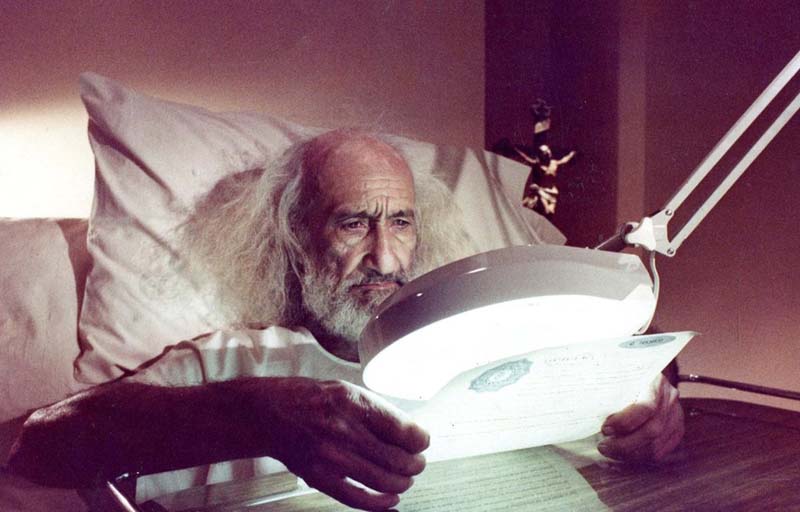
NL Twee mannen en een vrouw rijden door de straten van Cali, Colombia, op zoek naar jongens om te vermoorden. Hun bloed is bestemd voor een oude suikermagnaat, die gebonden aan een ziekenhuisbed en kijkend naar films, zijn bloedtransfusies ondergaat. Zijn onderdanen vermoorden zodat hij in leven kan blijven en zijn macht behoudt.
Met deze horrorklassieker binnen het 'gótico tropical'-genre herdenken we de recent overleden regisseur Luis Ospina en de belangrijke rol die hij gespeeld heeft in de Latijns-Amerikaanse cinema.
EN Two men and a woman drive around the streets of Cali, Colombia looking for young boys who they murder to extract their blood and give it to a sugar magnate. In a hospital’s bed, the old magnate watches films and gets blood transfusions of the young people his employees murder in order to keep living and perpetuating his power.
With this classic of the gótico tropical (tropical gothic), we want to remember the recently deceased Luis Ospina and his important legacy for Latin American cinema.
Gratis toegang // free entrance
Zaterdag 2 november, 20:30
CONTEMPORARY
Chained for Life
Aaron Schimberg | 2018 | Verenigde Staten | 91’ | no subs
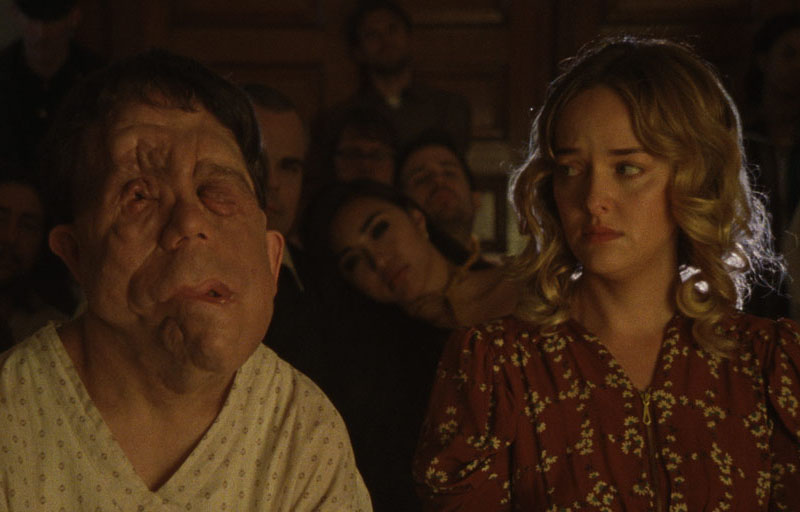
NL Hollywood actrice Mabel voelt dat ze buiten haar eigen comfortzone zit op de set van een horrorfilm met artistieke pretenties. Ze speelt de rol van een blinde vrouw in een film, waarvan de media verwacht dat deze van slechte smaak getuigd, die expliciet over misvorming gaat. Het verhaal van Chained for Life opent zich als een oneindige matroesjka. Het is een spel met gezichten en denkbeeldige spiegels. Uiterlijk en reacties komen haast circusachtig over, zonder te verzanden in clichés. De film reflecteert vanaf een filmset naar de buitenkant van de filmwereld: kijkers, acteurs en de film zelf werken als in een groep samen naar de kern van het verhaal. Geestdriftig en vol dramatische wendingen worden in dit aangrijpende visuele feest de grenzen tussen realiteit en fictie opgezocht.
EN On the set of a horror film with artistic pretensions, Hollywood actress Mabel admits to being outside of her comfort zone. She plays the role of a blind woman and the film she’s in, already anticipated by the media to be of bad taste, deals explicitly with deformity. In Chained for Life the layers of the story unfold like an infinite Matryoshka doll, the play with face(s) and imaginary mirrors and metaphors, appearances and reactions seem almost circus-like without being blatantly overt or cliché. Reflecting from a film set to the outside world to a set again it feels almost like we are working out in a group, through the film, viewers and actors together, what the story is about in its core. Full of dramatic twists and verve, in this gripping visual feast the boundaries between reality and fiction, fair representation and exploitation cinema become excessively porous.
Zaterdag 9 november, 20:30
CLASSIC
Clásicos Latinoamericanos: Wara Wara
José María Velasco Maidana | 1930 | Bolivia | 69’ | EN subs
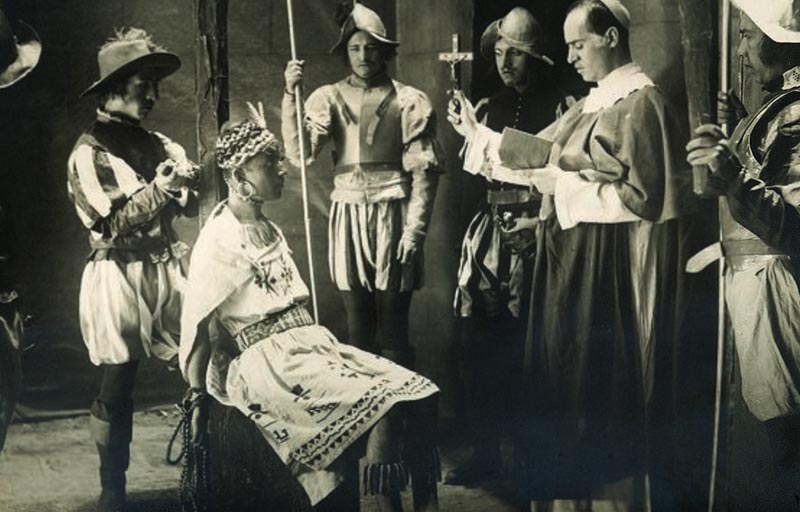
NL Dit verhaal over een frustrerende liefde tussen een Aymara-prinses en een Spaanse conquistador is door Alfonso Gumucio Dagron, de belangrijkste filmhistoricus van en over de Boliviaanse cinema, beschreven als de Intolerance (D.W. Griffith, 1916) van Latijns-Amerika. De productie eiste enorme inspanningen voor de constructie van de sets en de kostuums, terwijl de technologie met welke deze film tot stand kwam spartaans te noemen is met één camera en één Moviola. Verloren geacht in vijf decennia, komt Wara Wara naar ons heden om discussies over kolonialisme, gender en de representatie van niet-criollo’s in de Latijns-Amerikaanse samenleving te openen.
Clásicos Latinoamericanos is een langaanhoudend programma dat spit in de Latijns-Amerikaanse cinema om te reflecteren naar hoe deze zich door de jaren ontwikkeld heeft en welke relatie het met Nederland heeft en had. Samen met speciale gasten en het publiek graven we dieper in de consequente conflicten, problemen en belangen van dit werelddeel.
EN This story of a frustrated love between and Aymara princes and a Spanish conquistador has been described as the Intolerance (D.W. Griffith, 1916) of Latin America by the main historian of Bolivian cinema Alfonso Gumucio Dagron. Its production demanded enormous efforts in the construction of sets and costumes, while the technology with which it was produced was simple and reduced to a camera and a Moviola. Lost during the five decades, Wara Wara comes to our days to open discussions on colonialism, gender, and the representations of the non-criollo in Latin American society.
Clásicos Latinoamericanos is a long term program that looks for digging in Latin American cinema to reflect on how it has been developed through history, the relationship The Netherland has have with it, and together with special guests and the audience reflect on consistent conflicts and issues of the continent.
Maandag 11 november, 20:30
SPECIAL
It’s About Time To Start (two films by Kaya Erdinç)
NL Kaya Erdinç (Maastricht, 1994) werkt als schrijver en filmmaker. Hij maakt films die poëtisch in hun onderwerp zijn, maar toch heel persoonlijk blijven. Na verschillende epistemologische onderzoeken in het cinematografische veld – vooral over Béla Tarr – begon hij aan de Academie van beeldende kunsten in Wenen en tegenwoordig woont en werkt hij in Glasgow. Dit programma bestaat uit twee vroegere werken welke zich bezighouden met cinema als zowel een stimulerend maar ook onderdrukkend productiesysteem: gelovend in het, alsook in twijfel trekkend tegelijker tijd. De filmmaker is na de vertoning aanwezig voor een Q&A.
EN Kaya Erdinç (Maastricht, 1994) has worked as a writer and filmmaker. Kaya makes films which remain largely personal and poetic in their subject matter. After several epistemological investigations in the cinematic field – most notably Béla Tarr’s film.factory – he enrolled at the Academy of Fine Arts in Vienna and is currently based in Glasgow. This program consists of two earlier films that engage with cinema as both an invigorating and constricting mode of production, believing and questioning it at the same time. He will be present for a Q&A after the screening.
The Exfoliation of a Cinephilic Eye
Kaya Erdinç | 2015 | NL | 75’ | EN subs
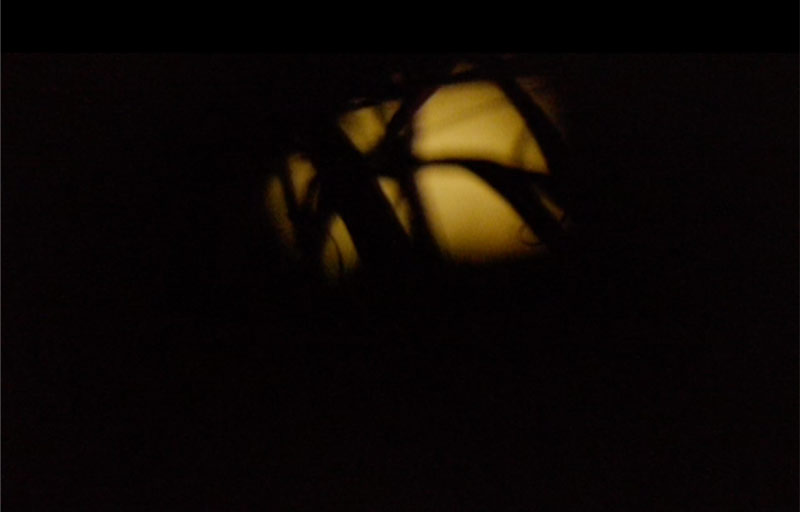
NL Teruglopende naar huis van een bioscoop na een transformerende ervaring vindt een cinefiel toevallig een camera, welke deze oppakt. Hij probeert op te nemen wat hij ziet.
EN While walking home from a cinema after a transformative experience, a cinephile accidentally stumbles upon a camera, picks it up, and tries to record what he is seeing.
+
It’s about: time // to star(t)
Kaya Erdinç | 2017 | NL | 65’ | EN subs
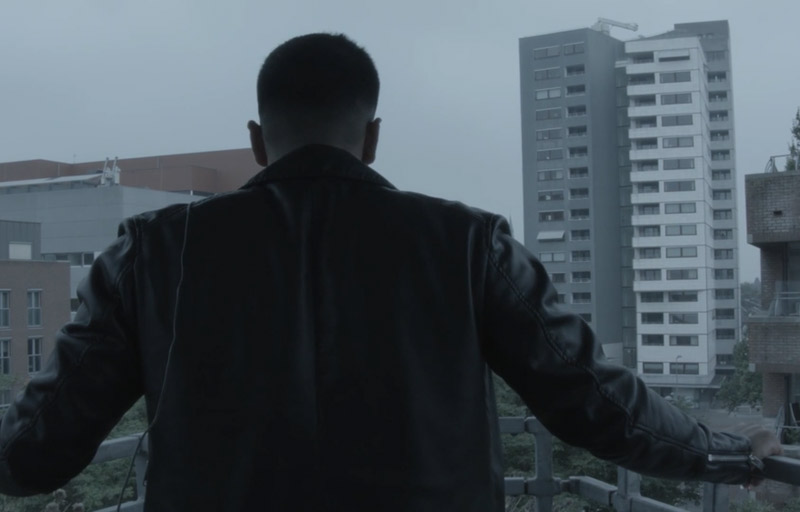
NL Twee jonge mannen, één met een Afghaanse achtergrond, de ander met een Turkse, groeien op in Maastricht. Op de middelbare school dromen ze erover om, met een blonde vrouw aan hun zijde, op te groeien in de chique wijk Ceramique. Jaren later doen ze onderzoek naar de achtergrond en grondbeginselen van dit verlangen door middel van een filmisch experiment.
EN Two young men, one with Afghan roots, the other one with Turkish roots, grew up in the small city of Maastricht, The Netherlands. In high school they used to dream of living in a fancy apartment in the expensive neighborhood, Ceramique, with a blonde woman on their sides. Years later, they research the roots and the residue of this longing by the means of a film experiment.
Vrijdag 15 november
Zaterdag 16 november
Zondag 17 november
Maandag 18 november
SPECIAL
Anarchist Film Festival
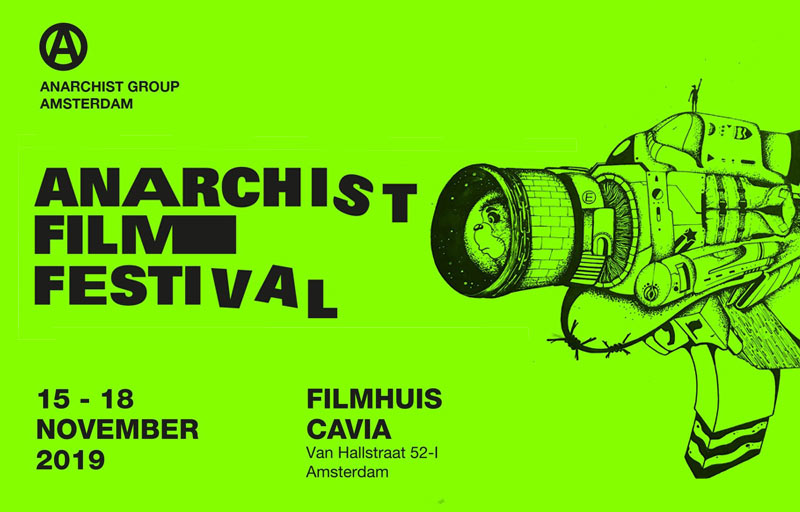
NL Cavia is trots om na een onderbreking van 7 jaar de comeback van het Anarchistische Filmfestival te hosten! De Anarchist Group Amsterdam heeft een driedaags festival georganiseerd, met een speciale 6 uur durende vertoning op maandag, in samenwerking met Filmhuis Cavia. We zullen een breed spectrum van anarchistische film presenteren, variërend van bedrieglijk kinderlijke animaties tot in-your-face soft-porn, van openhartige documentaires tot surrealistische verkenningen van de menselijke natuur. Meer info→
EN After a 7 year hiatus Cavia is proud to host the comeback of the Anarchist Film Festival! The Anarchist Group Amsterdam have organised a three day festival, with a special 6 hour screening on Monday, in collaboration with Filmhuis Cavia. We will be showcasing a broad spectrum of anarchist film, ranging from deceptively childlike animations to in-your-face soft porn, from candid documentaries to surrealist explorations of human nature. More info→
Vrijdag 29 november, 19:00
SPECIAL
The Other Side of the Underneath + Lecture on psychosis
Jane Arden | 1972 | UK | 132’ | no subs
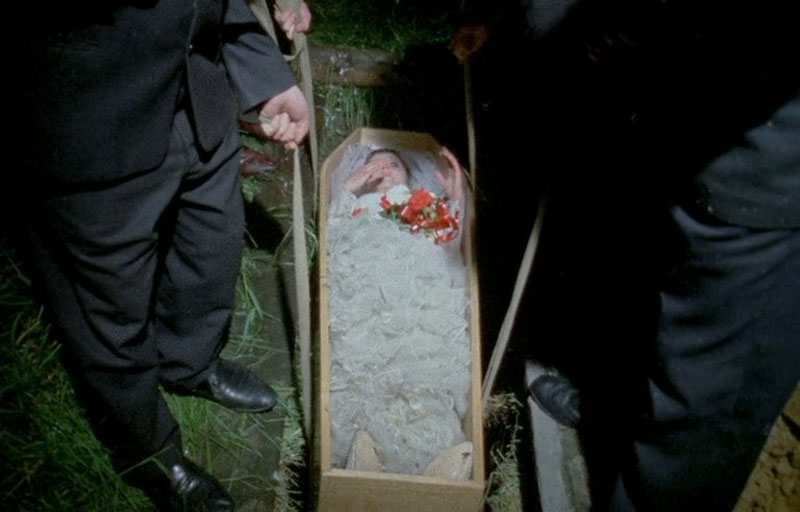
NL The Other Side of the Underneath, geregisseerd door toneelschrijver, actrice, dichter en scenarist Jane Arden, is een bewerking van Arden's toneelstuk A New Communion for Freaks, Prophets and Witches. Het is de enige Britse speelfilm uit de jaren zeventig die uitsluitend door een vrouw is geregisseerd; een film over een groep vrouwelijke patiënten in een therapiesessie. Een radicale en experimentele film, intrigerend vanwege de verontrustende voorstellingen van de mentale toestand van de schizofrene protagonist.
EN The Other Side of the Underneath, directed by playwright, actress, poet and screenwriter Jane Arden, is an adaptation of Arden's play A New Communion for Freaks, Prophets, and Witches. It is the only British feature film in the 1970s to be solely directed by a woman; a film about a group of female patients in a therapy session. A radical and experimental film, intriguing because of its disturbing depictions of the mental state of its schizophrenic protagonist.
+
Lecture by May-May Meijer on psychosis
Lecture | 30' | EN spoken
NL May-May Meijer (1972) promoveerde in de communicatiewetenschap aan de Vrije Universiteit in Amsterdam. Ze is nu voorzitter van de vredesorganisatie Peace SOS. Peace SOS steunt de zachte krachten in landen met gewapende conflicten. Daarnaast publiceert ze over haar kwetsbaarheid voor psychosen en manieën in Schizophrenia Bulletin van Oxford University Press en op PsychoseNet. May-May is moeder van een dertienjarige zoon.
EN May-May Meijer (1972) studied communication science at the University of Amsterdam, completing a Ph.D. dissertation in communication science at the Vrije Universiteit in Amsterdam. During her doctoral research she was chair of the national Ph.D. council. After her graduation May-May worked as assistant professor for the working group on Philanthropy at the Vrije Universiteit. She has been an advisor of an endowment of micro-credits for more than ten years. May-May founded the peace organization Peace SOS in 2016. As chair of Peace SOS, May-May publishes articles promoting peace through peaceful solutions in well-known Dutch national newspapers. She has also published several articles in the academic journal Schizophrenia Bulletin of Oxford University Press about her experiences with psychosis and depression. May-May is mother of a thirteen-year-old son.
